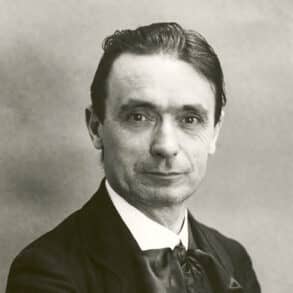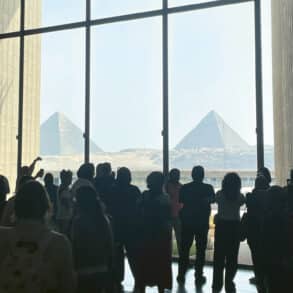For some, sports can take the place of religion. One can see traces of this ersatz spirituality: the spectacle of ritual, the larger than life stars and idols, and the communities of irrationally devoted fans. Still, this doesn’t mean sports should be rejected wholesale. On the contrary, they can become mythically charged, a location of magic. One such moment of magic occurred in this year’s draft lottery of the National Basketball Association (NBA), as the San Antonio Spurs won the rights to one of the most-hyped prospects of all time. Here’s a report from an insider’s perspective.
I was born into a rich homeland for experiencing sports as mythologically charged: San Antonio, Texas. As I was growing up, the NBA’s Spurs were building a dynasty using a combination of luck and innovation. Luck came in the form of two first-overall picks in the 1987 and 1997 drafts, which led to unusually trustworthy, humble, and successful stars: David Robinson and Tim Duncan, each of whom spent the entirety of their careers with the Spurs, a rarity in the NBA. In addition to their innovative scouting and drafting of many overseas players and their decidedly team-oriented play style, the Spurs won five championships between 1999 and 2014 and only narrowly missed two more through strokes of ill fortune. Absorbing years of this excitement, drama, and ingenuity into my youthful, sponge-like imagination, the Spurs have not only found an irrevocable place in my heart (“por vida”, or “for life”, as the fans’ saying goes) but a mysterious place in my psyche. The key players, coaches, and executives that are part of the Spurs’ epic tale regularly appear in my dreams, and I can find easy inspiration towards greatness in life by rewatching films of their successes. They have taken on a mythological dimension in my mind, becoming stars in my night sky, you might say.
The come-down from this epic success has been jagged and upsetting, as the Spurs have navigated retirements, spoiled hopes, and unsettling drama with key players since 2018. Slowly and surely, seasons have gotten steadily worse, and the team’s management made a clear decision to trade any existing assets for investment in future possibilities. This strategy reached a crescendo this year, as the Spurs traded away three of their best players for draft picks and finished with the third-worst record in the NBA, giving the team a 14% chance at acquiring the first pick in the draft lottery—the best odds they could have hoped for. This was no coincidence: this year’s draft features an undisputed, obvious #1 pick: Victor Wembanyama, a 7’4” French prospect with moves that drop the jaws of current NBA stars. “He’s got cheat-code vibes,” said Stephan Curry, considered to be the best three-point shooter of all time. “He’s more than a unicorn, he’s an alien,” said LeBron James, who was the last prospect to garner this much attention, back in 2003. In Wembanyama, many fans dream of a renewal of the Spurs of lore, a generational talent capable of resurrecting the fortunes of an entire organization.
It was the sports equivalent of a drought and the city did a collective rain dance. San Antonio, which has a rich Latinx culture—and therefore a connection to the traditions of Catholic prayer and indigenous rituals of brujería and curanderismo—showed no shame in their public displays aiming to bring Wembanyama to San Antonio, which had been ongoing for nearly a year. Murals of Wembanyama in a Spurs jersey popped up in the city, as did many actual jerseys. As the moment of the draft neared, I set my phone background image to a popularly circulating image of a white prayer candle with Wembanyama at the center. Indeed, it’s also clear that Wembanyama was hoping, if not praying, to go to the Spurs. In France, he played for two professional teams run by former Spurs, whom he rooted for when he was growing up.
The night of the draft lottery, which happened to be at 2am in France, was celebrated by a party at Nike’s headquarters on the Champs Elysées. Wembanyama’s parents had an agreement with the film crew to not broadcast live his reaction to the results, in case he wasn’t excited about where he landed. The caution wasn’t necessary—he was clearly overjoyed to land with the Spurs. In an interview afterwards, Wembanyama explained that he had a clear intuition foretelling that he would go to the Spurs. “Not to brag about it, but I knew what was going to happen and I actually recorded myself saying it this morning walking to practice. So yeah, the universe told me. Dreams, feelings, it happens sometimes, but it’s never wrong, it’s always right.” News outlets were quick to highlight the good-luck charms carried by the Spurs executives and sent to the organization by fans: golden keys, lucky socks, and the green chair one executive was sitting in during a previous lottery win. Photos quickly circulated of a young Wembanywama wearing a Spurs jersey.
More than just being a good story, this coverage depicts an appetite for the supernatural, for a story with an element of fate, a fairy tale, a meant-to-be. Perhaps this appetite for the supernatural is also connected to the ever-increasing popularity of basketball as a sport, in which larger-than-life stars produce a never-ending stream of highlights. In an era of materialism, folks will take whatever taste of the spectacular and improbable they can get. There’s certainly a shadow side to this easily-consumable spectacle, but amidst all the clamor and glamour, there’s undoubtedly a heart. This heart at the core of sports can flutter with thrill, break with tragedy, and thump with triumph. These stories become epics, and champions become heroes. In turn, these heroes express themselves in unabashedly superstitious and religious manners, talking about ‘the Basketball Gods’, or praising and thanking ‘God’ more directly. How interesting is this? At one of the centers of popular culture, where the body is most celebrated, we do not find mechanical materialism, but a reverence for and experience of something greater, a taste of magic.
Image NBA Playoffs in 2014, Photo: Katie Haugland (CC 2.0), Source: Wikimedia Commons










…to be continued with rock concerts etc. It´s like anthroposophists, while bending over their GA numbers, seem to have missed some of the mysteries of the 20th and 21st century. Beuys knew it was happening in the train stations. Cross knows it is all over in these stadiums which hold tens of thousands of people at a time. I was at one of the shows of the Final Tour of Dead and Company lately. No, it shouldn´t be rejected wholesale.